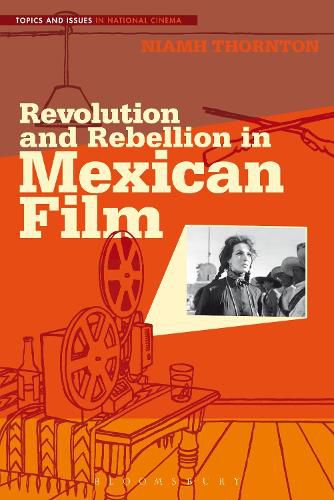Readings Newsletter
Become a Readings Member to make your shopping experience even easier.
Sign in or sign up for free!
You’re not far away from qualifying for FREE standard shipping within Australia
You’ve qualified for FREE standard shipping within Australia
The cart is loading…






Revolution and Rebellion in Mexican Film examines Mexican films of political conflict from the early studio Revolutionary films of the 1930-50s up to the campaigning Zapatista films of the 2000s. Mapping this evolution out for the first time, the author takes three key events under consideration: the Mexican Revolution (1910-1920); the student movement and massacre in 1968; and, finally, the more recent Zapatista Rebellion (1994-present).
Analyzing films such as Vamanos con Pancho Villa (1936), El Grito (1968), and Corazon del Tiempo (2008), the author uses the term ‘political conflict’ to refer to those violent disturbances, dramatic periods of confrontation, injury and death, which characterize particular historical events involving state and non-state actors that may have a finite duration, but have a long-lasting legacy on the nation. These conflicts have been an important component of Mexican film since its inception and include studio productions, documentaries, and independent films.
$9.00 standard shipping within Australia
FREE standard shipping within Australia for orders over $100.00
Express & International shipping calculated at checkout
Stock availability can be subject to change without notice. We recommend calling the shop or contacting our online team to check availability of low stock items. Please see our Shopping Online page for more details.
Revolution and Rebellion in Mexican Film examines Mexican films of political conflict from the early studio Revolutionary films of the 1930-50s up to the campaigning Zapatista films of the 2000s. Mapping this evolution out for the first time, the author takes three key events under consideration: the Mexican Revolution (1910-1920); the student movement and massacre in 1968; and, finally, the more recent Zapatista Rebellion (1994-present).
Analyzing films such as Vamanos con Pancho Villa (1936), El Grito (1968), and Corazon del Tiempo (2008), the author uses the term ‘political conflict’ to refer to those violent disturbances, dramatic periods of confrontation, injury and death, which characterize particular historical events involving state and non-state actors that may have a finite duration, but have a long-lasting legacy on the nation. These conflicts have been an important component of Mexican film since its inception and include studio productions, documentaries, and independent films.